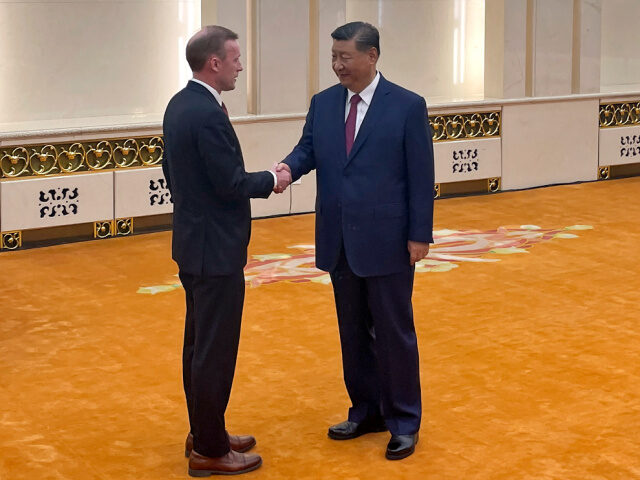Genocidal Chinese dictator Xi Jinping granted an audience to National Security Adviser Jake Sullivan in Beijing on Thursday in which, according to the Chinese Foreign Ministry, Xi lectured Sullivan to pressure America to reject “exclusion or regress” and “develop a right strategic perception” regarding China’s political agenda.
On Thursday, Sullivan is concluding a three-day visit to Beijing, his first since being appointed national security adviser. Most of his time in China focused around extensive conversations with Chinese Foreign Minister Wang Yi, the nation’s top diplomat and one of the most powerful foreign ministers in recent history. Prior to his arrival, an unnamed senior White House adviser told reporters they expected Sullivan to hold ten-to-12-hour conversations with Wang during his stay in the country.
Most of the content of those conversations has remained private, though both sides claim the talks have been productive. The Chinese Foreign Ministry also did not disclose any details of Sullivan’s encounter with Xi Jinping on Thursday, other than Sullivan reportedly effusively stating that leftist President Joe Biden is not seeking to challenge China’s totalitarian communist system or participate in a “new Cold War” with China.
The Chinese Foreign Ministry readout of the meeting focused largely on Xi’s remarks to Sullivan, which painted the United States as a belligerent power and placed no responsibility on China to responsibly relate to Washington.
“President Xi pointed out that in this changing and turbulent world, countries need solidarity and coordination, not division or confrontation. People want openness and progress, not exclusion or regress,” the Foreign Ministry shared. “As two major countries, China and the United States should be responsible for history, for the people and for the world, and should be a source of stability for world peace and a propeller for common development.”
Xi described “a right strategic perception,” meaning adapting America’s international behavior to Beijing’s interests, as “the No.1 issue” in any conversation with Washington, and claimed that China’s “strategic intentions are above board.” The readout notably omitted Xi making any mention of China’s use of illegal secret police stations on U.S. soil, its rampant intellectual property theft, or its espionage activities against American interests.
The readout described Xi going on to lecture Sullivan that America should view China “in a positive and rational light” and adopt policies promoting “mutual respect, peaceful coexistence, and win-win cooperation.” Sullivan reportedly responded by “reiterat[ing] that the United States does not seek a new Cold War, it does not seek to change China’s system, the revitalization of U.S. alliances is not against China, the United States does not support ‘Taiwan independence,’ and it does not seek conflict with China.”
Taiwan is a sovereign state off the coast of China that the Communist Party falsely claims as a province under rightful ownership of Beijing. Since the administration of leftist President Jimmy Carter, the United States has indulged this fantasy, refusing to acknowledge the reality of Taiwan’s sovereignty in any formal matter, though it maintains some informal communication with its government, outraging Beijing.
The Foreign Ministry did not mention Sullivan raising the issue of China’s ongoing genocide of majority-Muslim Uyghur people in East Turkistan, its widespread human rights atrocities against political dissidents, China’s colonization of impoverished African nations, or other problematic behavior.
The White House published a readout of the meeting that listed a variety of topics completely absent from the Chinese version of the meeting’s contents.
“The two sides discussed … counternarcotics, military-to-military communications, and AI safety and risk,” the White House claimed. “They also discussed cross-Strait issues, Russia’s war against Ukraine, and the South China Sea.”
The White House confirmed reports that Sullivan’s meeting would soon lead to a phone call between Xi and outgoing President Biden. The Chinese Foreign Ministry stated that Xi told Sullivan he looked forward to speaking to Biden soon but offered no more specifics. Some reports in American media have indicated that, beyond the phone call, Biden may seek a final, in-person meeting with Xi before his presidential term ends in January.
The Biden administration has emphasized the alleged conversations on artificial intelligence, climate, and drug trafficking throughout the week, especially in the initial conversations with Foreign Minister Wang Yi.
“Mr. Sullivan and Director Wang discussed next steps to reduce the flow of illicit synthetic drugs, continue repatriation of undocumented migrants, and law enforcement cooperation,” the White House claimed on Tuesday. “They underscored the importance of concrete steps to tackle the climate crisis and welcomed further discussions during Senior Advisor to the President for International Climate Policy John Podesta’s upcoming travel to China.”
China is a major global source of precursor ingredients to produce the deadly opioid fentanyl and, despite Biden’s efforts, has done little to curb the production of those precursors. It is also far and away the world’s worst carbon emitter and polluter generally, dramatically expanding its use of coal and polluting nations in which it mines for rare-earth minerals.

COMMENTS
Please let us know if you're having issues with commenting.